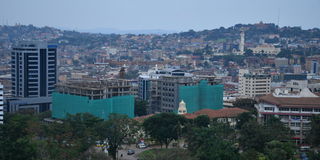Prime
Taxes cannot be excuse for rising rent prices

There has been an increase in rental price in Kampala and surrounding areas. PHOTO | Edgar R Batte
What you need to know:
The article, typical of opinionated journalism, claimed the trend was being fuelled by new taxes and an influx of foreigners
Last Wednesday, Gabriel Buule wrote an article in Daily Monitor about rental rates.
The article, which I would say was a collection of opinions, sought to understand why rental rates for houses in Kampala were rising. I must say, it left me more confused.
The article, typical of opinionated journalism, claimed the trend was being fuelled by new taxes and an influx of foreigners.
However, the article seemed to tell a lot of half-truths, omitting important facts.
Let’s start with the claim of “new taxes created by government are driving up rental rates”.
In Kampala, property tax, which is 6 percent on the value of a commercial property, is levied by KCCA. It is not a new tax. It has been around since 2005.
KCCA performs property valuations every five years (or more), and the last valuation was undertaken in 2017. Therefore, KCCA is levying a 6 percent tax that was determined five years ago.
Away from this is Ground Rent, an annual cost of leasing land from KCCA. All these are not new.
However, beyond this, the article also touched rental income tax, a levy by URA rated on gross income generated from housing lease or rent.
However, it failed to mention that landlords can claim up to 75 percent in deductions against rent they collect, and that both property tax and ground rent are allowable deductions that reduce one’s rental tax liability.
To quote: “This means that if the annual rent of a residential house owner is Shs100m, 30 per cent is paid to URA after deducting expenses”.
While the statement is technically true, it doesn’t explain the full story. Let’s break down how much tax a landlord is actually liable to pay. A landlord, who earns rental income of Shs100m is allowed to claim expenses (property rates, ground rent and losses, among others) of up to 75 percent. Rental expenses are calculated as chargeable income equals to total rental income minus allowable expenses
Therefore, the article admits that a landlord who earns Shs100m in rental income is only liable to pay Shs7m after deductions.
By comparison, an individual earning Shs100m is charged Shs30m as deductables due to pay as you earn.
The article claims that rental rates in Kampala have increased by as much as 50 per cent in some areas.
How can “new taxes created by government” be the cause, when in reality rental income tax has an effective tax rate of only 7.5 per cent after deductions are factored in?
Rental income tax is not new either. Government just made changes in legislation.
However, to eliminate distortions created by the recent legislation, we shall also need to breakdown a few things.
As of July 1, rental income tax for individual landlords rose from 20 percent to 30 percent. However, a cap on allowable expenses was raised from 20 per cent to 75 percent, which meant that after factoring in deductions the cap would drop from 16 percent to 7.5 percent.
In effect, this meant that government had given landlords an effective tax reduction of 8.5 percent. Therefore, to claim “new taxes created by government” was the cause of the increase in residential rental rates, is simply misleading.
Let’s also look at the article’s claim that an influx of foreigners was driving up residential rent rates. The article, under the subheading of ‘refugee influx’ made unfounded claims.
According to Knight Frank’s 2020 half year Kampala Market Performance report, many foreigners, who indeed form a large part of the tenant market, repatriated to their home countries at the announcement of a lockdown in March 2020. This resulted in decreased occupancy and rent levels.
Expatriates left amid fears of being locked out of their native countries thus causing a drop in occupancy of prime residential units by 8 percent.
Knight Frank further acknowledges that during the first six months of 2021 had seen the return of numerous expatriate employees.
Therefore, the increase in rental rates is a likely recovery of the market and return of the status quo. Knight Frank further noted that foreign returnees occupy high-end commercial units, which are outside the demand structure of Ugandans.
Therefore, to imply that foreigners are outcompeting Ugandans for rent resources is not true.
It should also be pointed out that migrants are not considered refugees, and shouldn’t be labelled as such.
The distinction between migrants and refugees is an important one. Migrants can chose to move back and forth, whereas refugees, who are in danger of conflict or persecution, do not have the luxury of choice.
Refugees are therefore, entitled to certain rights, such as protection from being returned to situations that might threaten their lives, whereas migrants have no such rights.
Choices about words do matter.
By Faith Sanyu
Ms Sanyu is a journalist specialising in coverage of real estate.




